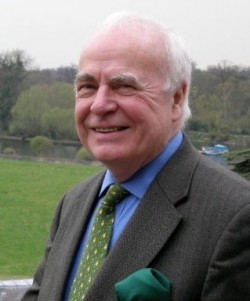Hugh McIlvanney, a “colossus among sports writers”, is to retire at the end of this month.

At 82 years old, the only sports journalist ever to win Journalist of the Year at the British Press Awards will be ending a glorious career which has also included being named the SJA Sports Writer of the Year a record six times.
McIlvanney received the OBE in 1996 and in 2009 he was inducted into the International Boxing Hall of Fame. He has also been recipient of the SJA’s highest honour, the Doug Gardner Award for services to sports journalism.
At the British Sports Journalism Awards in London on Monday, McIlvanney received a prolonged and emotional standing ovation from around 450 colleagues when his friend, Patrick Collins, proposed a toast to the Sunday Times writer, saying “he has, and will always have, our admiration and our respect”.
Earlier in the evening, McIlvanney had been among the contenders for the Sports Columnist of the Year prize, 40 years after he had been the joint winner of the first Sports Writer of the Year award.
McIlvanney has also worked for The Scotsman, the Daily Express and The Observer, before joining the Sunday Times in 1993, where he again graced the back page of its sports section this week, his commentary on the boxing scene as sage and shrewd as ever.
Collins, the SJA President, said, “I can think of only three people over the past 50 years who have succeeded in raising the standards and redefining the craft of sports writing. One was Ian Wooldridge, another was Frank Keating, and the last member of that astonishing trinity is here with us this evening.
“To call Hugh McIlvanney a great sports writer is rather like describing Muhammad Ali as a useful heavyweight.

“He is a colossus among sports writers, a man who has been named Sportswriter of the Year no fewer than six times, and is the only sports writer to have been honoured as Journalist of the Year in the British Press Awards.
“And still he’s not satisfied: in fact, in his 82nd year he’s even made it to one of the shortlists at these awards tonight.
“But later this month, Hugh is going to retire from the trade he loves so well.
“He’s already won everything that the SJA and journalism at large can possibly offer him.
“But I’d like to show him tonight that he has, and will always have, our admiration and our respect.”
For more coverage of the #SJA2015 Sports Journalism Awards:
- Sibley’s football shot hits the back of the awards net
- Award gives Tyler something to shout about
- Six of the best from photographer Crowhurst
- Hayward is Sports Writer of the Year for third time
- The SJA is the largest member organisation of sports media professionals in the world. Join us: Click here for more details
UPCOMING SJA EVENTS
- Mon Mar 7: SJA Diversity Forum, sponsored by BT Sport
- Wed May 11: VIP York Race Day, sponsored by Ladbrokes
The best sports journalism combines a profound knowledge of and love for sport with an ability to report on or write about it with lucidity, balance, nuance, honesty, fairness, consideration and, yes, judgement. The greatest sportswriters ever to come out of the British isles – Neville Cardus, Geoffrey Green, Hugh McIlvanney and David Lacey – displayed these qualities with consistency and conviction, dedication and distinction. Cardus wrote wonderfully well on cricket and music in what was then The Manchester Guardian. In newspapers from The Scotsman and the Daily Express to The Observer and The Sunday Times, McIlvanney has written evocatively on a variety of sports like boxing, football, track and field, Formula One, rugby, horse racing, tennis, golf, etc., but boxing seems to have provided him with the grandest stage to showcase his spectacular skills as a writer. As chief football correspondent of The Times from 1938 to 1976, Geoffrey Green set the highest international standards of excellence and expertise in reporting/writing on the world’s greatest spectator sport that have been matched by only David Lacey who joined The Guardian in 1964, working as a football reporter and chief sub-editor, eventually becoming chief football correspondent from the early 1970s to 2002 when he retired from that post after covering the South Korea-Japan World Cup. Contemporary sportswriters can learn so much from these modern masters who deserve to be acknowledged and regarded as the Fab Four of modern British print/written sports journalism.